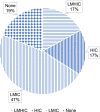The role of health systems for health security: a scoping review revealing the need for improved conceptual and practical linkages
- PMID: 35570269
- PMCID: PMC9107590
- DOI: 10.1186/s12992-022-00840-6
The role of health systems for health security: a scoping review revealing the need for improved conceptual and practical linkages
Abstract
Background: Practical links between health systems and health security are historically prevalent, but the conceptual links between these fields remain under explored, with little on health system strengthening. The need to address this gap gains relevance in light of the COVID-19 pandemic as it demonstrated a crucial relationship between health system capacities and effective health security response. Acknowledging the importance of developing stronger and more resilient health systems globally for health emergency preparedness, the WHO developed a Health Systems for Health Security framework that aims to promote a common understanding of what health systems for health security entails whilst identifying key capacities required.
Methods/ results: To further explore and analyse the conceptual and practical links between health systems and health security within the peer reviewed literature, a rapid scoping review was carried out to provide an overview of the type, extent and quantity of research available. Studies were included if they had been peer-reviewed and were published in English (seven databases 2000 to 2020). 343 articles were identified, of those 204 discussed health systems and health security (high and medium relevance), 101 discussed just health systems and 47 discussed only health security (low relevance). Within the high and medium relevance articles, several concepts emerged, including the prioritization of health security over health systems, the tendency to treat health security as exceptionalism focusing on acute health emergencies, and a conceptualisation of security as 'state security' not 'human security' or population health.
Conclusion: Examples of literature exploring links between health systems and health security are provided. We also present recommendations for further research, offering several investments and/or programmes that could reliably lead to maximal gains from both a health system and a health security perspective, and why these should be explored further. This paper could help researchers and funders when deciding upon the scope, nature and design of future research in this area. Additionally, the paper legitimises the necessity of the Health Systems for Health Security framework, with the findings of this paper providing useful insights and evidentiary examples for effective implementation of the framework.
Keywords: COVID-19; Health security; Health systems; Health workforce; Rapid review.
© 2022. The Author(s).
Conflict of interest statement
The authors declare no competing interests. The authors alone are responsible for the views expressed in this article and they do not necessarily represent the views of the organisations listed.
Figures




References
-
- WHO. The World Health Report 2007 - The world health report 2007 : a safer future : global public health security in the 21st century. World Health Organization, https://apps.who.int/iris/bitstream/handle/10665/43713/9789241563444_eng... (2007).
-
- Hays JN. The burdens of disease: epidemics and human response in western history. Rev. New Brunswick, N.J: Rutgers University Press; 2009.
-
- Aginam O. Electronic Law Journals - LGD 2003 (1) - Aginam. Law, Social Justice and Global Development Journal, https://warwick.ac.uk/fac/soc/law/elj/lgd/2003_1/aginam (2003, Accessed 9 Jan 2021).
-
- Garrett L. The Coming Plague. London: Atlantic Books, https://www.lauriegarrett.com/the-coming-plague (1994, Accessed 9 Jan 2021).
Publication types
MeSH terms
Grants and funding
LinkOut - more resources
Full Text Sources
Medical
Miscellaneous

